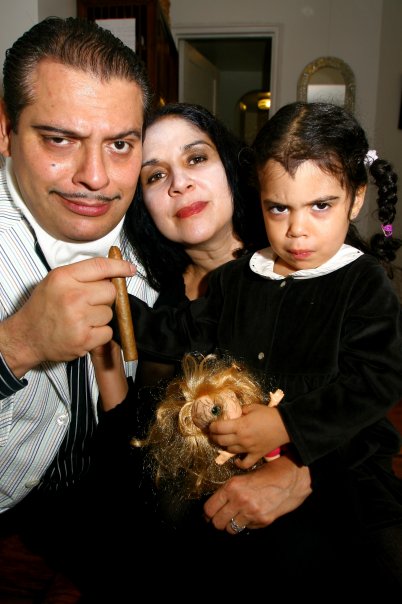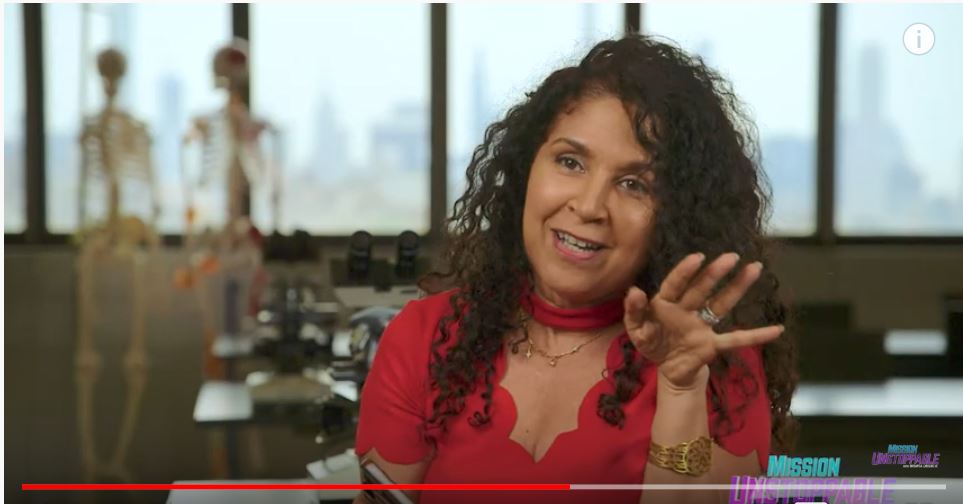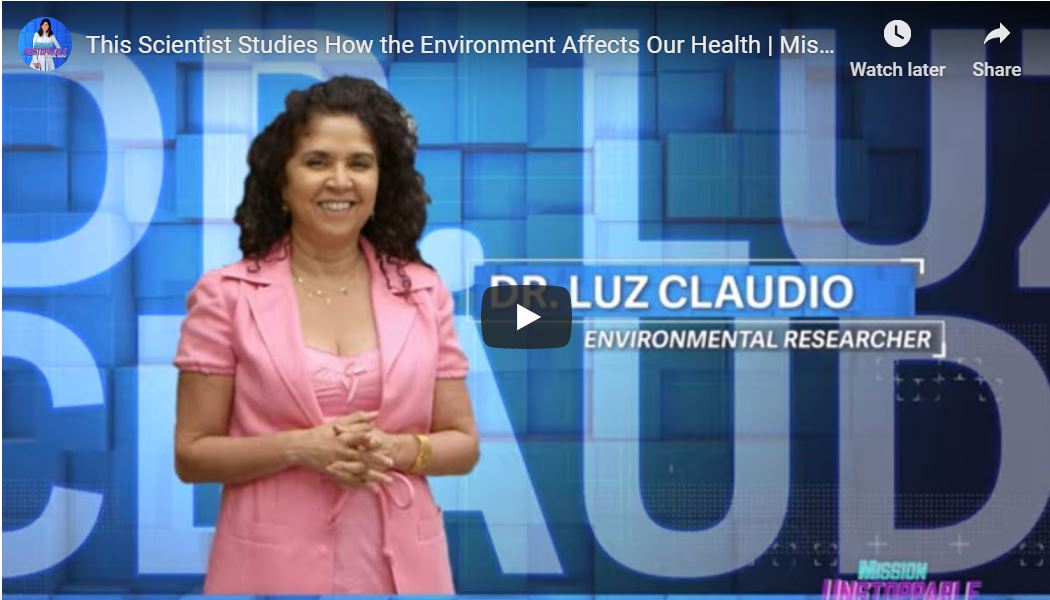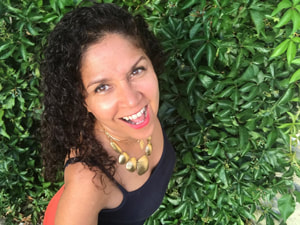|
Halloween is a time to celebrate everything scary. We laugh at witches and ghosts and dress up as the Addams family. But what do we do when real fear holds us back from achieving our greatest potential?
I have mentored hundreds of graduate and medical students, most of whom are underrepresented minorities. We get into in-depth conversations about their career choices and the opportunities and the obstacles that stand in their way. Some common patterns emerge, including fears. Fear can be healthy. It can keep us from harm. But fear can also be paralyzing. As Franklin D. Roosevelt once said: “The only thing we have to fear is fear itself.” Below are some of the fears that I have found most commonly in my students and some of my advice to them: Fear of making the wrong decision: I would say that this is their fear numero uno! Many of my students are already deep into a career path. They are already out of college; most of them have already graduated with a bachelor’s degree in the sciences. Now they are deciding what to do next. They ask things like “Should I go to med school?” “Master’s program?” “Ph.D.?” and worst of all, they ask; “Did I make a mistake choosing my major in college?” They have so many choices in front of them that, as if it weren’t hard enough, they second-guess choices they no longer have because those choices were made in the past.Too many choices can paralyze a person with indecision because the fear of making the “wrong” decision is too strong. In his book The Paradox of Choice, psychologist Barry Schwartz argues that too many choices create anxiety. He recommends a systematic approach toward making a choice that involves six steps. Some helpful choice-making steps from this book that students can apply to make their career decisions are:
FOMO: Yes. Fear of missing out is a big one for my students. This one is about fearing that the career path they didn’t choose is more: fun, lucrative, fulfilling, etc. than the one they chose. This fear is intensified when they view posts on social media or messages from people who did choose that other career path. As we all know, the day-to-day of any career is much less glamorous in reality than it seems on social media. But my students still fear that other friends or classmates have it better than them because they seem to have made a better choice. To alleviate this fear, I have told students to look at their own social media postings. Did they post any pictures of the all-nighter they pulled to create a poster for a presentation or did they only post a picture of themselves in front of the poster after it was done? Did they post pictures of themselves working for 12 hours in front of the computer, or a picture of themselves receiving the diploma after their dissertation was accepted? Just in the same way, what their friends post on social media is not always an accurate representation of the hard work and determination it takes to actually achieve a successful career. Who knows, there’s probably someone out there having a major case of FOMO over the life they think you have. ;) Fear of disappointment: Many students I see have a fear of disappointing others. Even students who are far into their career experiences want to please their parents, teachers, and mentors and make them proud. For some, this means that they have to pursue a career as a medical doctor because this is something their parents want or expect. Choosing another career path can seem like a terrible disappointment that no good son or daughter would want to impose on their parents. I try to help students understand two things. First, that it is their own life they are living, not their parents’ lives. Second, I try to reassure my students that their parents will understand (eventually) if they take the “disappointing” career path, as long as they do well in what they choose. However, I must admit that sometimes this is not exactly the case. Some parents are really vested in their children’s career choices and others not so much. I’ve had parents call me and tell me how important it is for their child to go to medical school, and have even received a threatening letter when a student was not accepted into my program. I try to explain to these parents that the alternative is worse. Who hasn’t met someone who is miserable in their profession? I bet many of them are miserable because they pursued the profession that their parents chose for them. A healthier approach to this fear could be having a heart-to-heart conversation with your parents. I know that it can be super scary. But it beats a lifetime of trying to live someone else’s life. Most parents wish a life of fulfillment and happiness for their children. We parents need to understand that sometimes, the career we set out for our children is not the path they can or want to take. Test Anxiety: Apparently, this is a real thing. Many of my students can know a subject very well, be able to do everything correctly in class, explain all concepts perfectly, and be as sharp and smart as can be. But, when it comes to testing, (especially standardized tests), they fail to show that same brilliance. I have seen students study a whole year to take the GRE then not show up on the day of the exam. I’ve also had several students who, while trying to get into medical school, take the MCAT over and over again, only to get worse scores every time they take it. Putting the issues with standardized testing aside, test anxiety can be a real paralyzing fear for some students. Of course, feeling some worry and even some fear about taking an important test is normal, and may even be beneficial. That little void at the pit of your stomach can be a good motivator. But when that feeling becomes real cold-sweated fear and doesn’t let you show what you know on a test, that is test anxiety. According to the Mayo Clinic, these are some of the things you can do to alleviate test anxiety:
Lack of Fear of Student Debt: Interestingly, not so many of my students have expressed financial fears, even though most of them have student loans that are, to me, horrifying. Most don’t mention their student loans unless I ask, which is scary in itself because I think that many students don’t want to face their financial situation. This denial of fear allows them to borrow more money, but at what cost?! I would argue that denial of fear also has its consequences. Having some degree of fear of student debt is be a healthier approach to career decision-making. Helping our students face their fears, address the ones that block their path to success, and face the real obstacles that can truly derail them is part of our job as mentors. Students, you are not alone in your fears. Being open about your fears and having a plan for dealing with them will set you free. Happy Halloween!
0 Comments
As scientists, we are used to giving seminars, presentations, and speeches to different audiences. For some people, it is easy. For others like me, it is the stuff nightmares are made of. But no audience is more challenging than a group of children. If you don’t catch their attention quickly and retain it, you are doomed. I have seen colleagues who are brilliant tenured professors in their jobs, have epic fails when presenting to a classroom full of schoolchildren. I know, I’ve been one of the epic fails. And the thing is, there is an increasing need for engaging children in doing science. To have a more diverse and dynamic scientific workforce, children need to be exposed to role models early and often. They need to see what it might be like for them to be a scientist, that there are scientists who look like them, and that science is, well, awesome! Here are five quick tips to keep in mind whenever you have an eager and demanding audience of children for your presentation, whether your presentation is on national TV or at your child’s school.
One of the most cringe-worthy videos that I have ever seen online is the one of Senator Dianne Feinstein talking to a group of young climate activists. Agh! The video has everything: interrupting the children, the “I have 30 years of experience,” dismissive comments, and, gasp! Telling a girl of color to “take that back to whoever sent you here” Even the senator’s body language, with her arms crossed and literally talking down to the children is the very definition of condescending. It’s as hard to watch as a terrible car crash. Ugh! The looks of disappointment, frustration, and sadness on the children’s faces is just heartbreaking. You don’t want to break children’s hearts, do you? If you can stomach watching this video to the end, remember it next time you are talking to children about science or any other topic. Let it be a cautionary tale of what not to do. Believe me, I know. I may have done something like this in the past, especially before I had children. Thankfully, it was not caught on tape, but now I know better. There is no excuse for treating children like this. Instead of a condescending attitude, try to remind yourself of what you are there to do. You should not expect that the children will learn all that there is to know about your topic from that one presentation. Your purpose is to encourage their curiosity and to leave them inspired. Remember that. See the infamous video here: https://youtu.be/jEPo34LCss8
When you are the real you, it is palpable. If you love your career in science, this will naturally show through your presentation, whether you are funny or serious. One way to get yourself into it is to start your presentation by saying something about that moment. Offering a comment about the nice room where you are giving the presentation, or the weather, or anything that is happening in the now, will get you in touch with yourself at that moment and help you feel more present. In my presentations, I just try to let my real personality show and be authentic. Even if that gets me off the script a little bit, it helps me to get into it and enjoy giving the presentation.
There is a whole field of study on communicating science to the general public. Sometimes, it is not so easy to do. Use any tools that may help you visualize and explain your concepts. Can you use analogies? Can you create an infographic? Can you make a diagram or use props to illustrate your ideas? Think creatively. The act of simplifying your content to its core will also help you in generating new ideas and seeing your science with a different perspective. It is worth also doing this when you are presenting to diverse audiences that are not in your field, and even for grant proposals. We have studied how groups of lay audiences, such as study participants, can gain increased knowledge when complex information is presented in simple but impactful formats. Here is one of our studies in this area: https://www.drluzclaudio.com/uploads/2/6/2/6/26264188/claudio_et_al_communicating_environmental_health.pdf And above all, do not reject invitations to speak at your local elementary schools as unimportant or a waste of your time. You never know if you will spark an idea in a young mind. This happened to me as a young person. The first time I met an actual working scientist, I was in 12th grade. It was the US energy crisis, and scientists from Oak Ridge National Laboratory came to my school in Puerto Rico to teach us how to save energy. I will never forget the scientist’s presentation in which he asked: Which razor saves more energy to the country, the electric razor, or the disposable blade? That was it! I was hooked on science. It seems like nowadays, whenever we hear the word "environment" in the media, it refers to the latest disaster caused by the climate crisis or the latest commonplace chemical found to cause cancer. Children, of course, are exposed to this barrage of information and feel helpless and hopeless. The environment is bad, and there's nothing they can do about it.
Yes. The situation is dire. But unless we give some sense of empowerment to children, how can we expect them to care? Some children have turned to activism, but it is not every day that students can walk out of class in protest. For the most part, all that children hear is the predictions of environmental doom. And they are going to tune it off. With that in mind, I agreed to participate in this great new TV program called Mission Unstoppable. With support from the Lyda Hill Philanthropies, it aims to show how STEM can be part of our everyday lives, and for at least some of us, STEM can also be at the center of our careers. The show focuses on women doing all kinds of STEM things, because well, why not? It doesn't beat you over the head to say that "girls can do anything." Instead, it shows you diverse girls doing everything and anything that has to do with STEM skills. The producers filmed 8 hours of me talking for a 4-minute feature! That in itself was eyeopening for me. I didn't know how much work it takes to produce TV content. In the interview, I tried to show that:
As my daughter said when she saw the show: "That was really cool." For me, to go from dork to cool, even if only for four minutes, is a step forward. Thanks to Adina Pliskin and Robyn Ramirez from Litton TV and to interviewer Erica Hernandez. Thanks also to Mount Sinai staff and students Marlene Naanes, Lisa Cole, Chrystal Galan Rivera, and Frances Morales Ramos, for their assistance during the long hours of filming. 8 Women Scientists Answer Questions from Children: How Useful Would You Be in a Zombie Apocalypse?10/9/2019 Promotional video for Mission Unstoppable, Saturday mornings on CBS Network Talking to children about your career in science can be totally unpredictable. Even when you prepare a nice presentation and in-depth discussion about the pros and cons of a career in science, children will always surprise you with their reactions and questions.
In my TED Talk, I mention a presentation I did about the results of an environmental health assessment to a group of girls who had participated in the study. I was surprised to be asked about my high-heel shoes and my curly hair! On another occasion, I did a cow eye dissection at my daughter's school. While the girls' eyes got super big and they covered their mouths in gasps, the boys ran away from the dissection tray. One of them nearly fainted and had to sit down. Another boy said he "barfed a little bit". But slowly, once the children got engaged in the activity, they did not want to stop. They marveled at the gooey vitreous, looked through the lens, and drew pictures of the colorful tapetum lucidum. Years later, I'm known in the school as the "mom-scientist". The father of one of my daughter's classmates said: "she curiously dissects even the fish she eats for dinner". So I should have been prepared when I was interviewed for a new TV Show called Mission Unstoppable to air Saturday Mornings on CBS starting October 12. After the show, the producers asked women scientists to read questions submitted by children. In this episode, we were asked: How Useful Would You Be In a Zombie Apocalypse? According to my 12-year-old daughter, that's a thing... In my response, I had more questions than answers because I don't know much about zombies. Still, I'm a scientist and a mom, so I know I would be really useful if one day the zombies do come. ;) Watch the show on TV (Saturday mornings on the CBS Network) or subscribe to their Youtube channel here: Mission Unstoppable |
This section will not be visible in live published website. Below are your current settings: Current Number Of Columns are = 1 Expand Posts Area = 1 Gap/Space Between Posts = 8px Blog Post Style = card Use of custom card colors instead of default colors = 1 Blog Post Card Background Color = current color Blog Post Card Shadow Color = current color Blog Post Card Border Color = current color Publish the website and visit your blog page to see the results AuthorDr. Luz Claudio is an environmental health scientist, mother and consultant, originally from Puerto Rico. She is a tenured professor of environmental medicine and public health. Luz recently published her first book: How to Write and Publish a Scientific Paper: The Step-by-Step Guide. Dr. Claudio has internship programs and resources for young scientists. Opinions expressed in this blog are solely her own and may not reflect her employer's views. Categories
All
|
|
Dr. Luz Claudio
[email protected] |
|
Opinions expressed in this website are solely Dr. Luz Claudio's own and may not reflect her employer's views. None of the information on this website should be taken as medical advice.
© COPYRIGHT 2018. ALL RIGHTS RESERVED.





 RSS Feed
RSS Feed